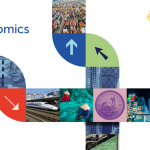Economics | SOAS
The SOAS MSc Economics provides unique training in both mainstream and heterodox theories and methods. It allows students to develop quantitative and qualitative skills and critically use these to analyse and address the challenges that the global economy is currently facing, like climate change and inequalities.
How does the programme provide content to ensure students achieve an understanding of a reasonably diverse set of perspectives on understanding economies?
In macroeconomic modules, students have the opportunity to engage with different schools of macroeconomic thought on issues like inflation, unemployment, inequality, money creation, climate change and macroeconomic policy. In microeconomic modules, different theoretical perspectives on issues like market failures, risk, market structures and production are compared and contrasted. Optional modules like ‘China and World Development’, ‘Economic development of Africa’ and ‘Political economy of development and change in the Middle East’ allow students to engage with regional perspectives, based on the tradition of SOAS. The ‘Advanced Macroeconomics’ module takes gender and ecological issues in macroeconomics further and the optional module ‘Gender Economics’ offers a focused engagement beyond the traditional gender blindness of economics.
How does the programme ensure students understand the interaction between economic and ecological systems?
Students are introduced to the tradition of ecological economics which views the economy as being embedded into the ecosystem. In the core module ‘Advanced Macroeconomics’, mainstream and heterodox theoretical and modelling approaches to the macroeconomics of climate change are discussed. Students also engage with the recent debates about the role of macroeconomic policies for achieving the transition to a low-carbon economy. Optional modules, like the ‘Economics of Environment and Development’ and ‘Green Finance’ give students the opportunity to obtain a deeper understanding of the interactions between economic, financial and ecological systems. Students can also participate in the SOAS Economics Sustainability Working Group which organises reading sessions on the links between economics and ecological sustainability.
How does the programme ensure students understand how to critically explore real-world evidence, both qualitative and quantitative?
In ‘Econometrics’ and ‘Advanced Macroeconometrics’ students receive training in modern econometric methods and learn how to use these to examine quantitative empirical evidence. They learn how to write their own codes in R for the purposes of data analysis. In ‘Advanced Macroeconomics’, R is used to critically evaluate macroeconomic models through simulations. In further advancing their knowledge of microeconomics and macroeconomics, students use case studies and real-world examples to evaluate the strengths (or weaknesses) of specific economic theories. The optional module ‘Research Methods’ pays particular attention to qualitative methods in economics and equips students with the necessary skills for mixed methods research.
What pedagogical approaches does the programme use to ensure that students examine the historical context, assumptions and values in all economic thinking?
In microeconomic and macroeconomic modules students participate in group discussions where they are asked to reflect on the historical context within which specific theories were developed and how this is reflected in their underlying assumptions. Most modules do not rely on a textbook approach. Instead, a variety of sources (including academic papers, newspaper articles and videos) are used to introduce students to different perspectives to economic issues and equip them with the capacity to examine the links between different economic theories and the real world. Students are explicitly asked in their assessments to compare and contrast different theoretical perspectives and use theories to evaluate contemporary economic phenomena and policies, like the COVID-19 crisis, climate finance, quantitative easing, climate fiscal tools etc.
How does the department ensure that the teaching culture and capacity to deliver economic pluralism are continually improving?
The SOAS Department of Economics has a deep commitment to economic pluralism. The Department remains strongly committed to decolonising its curriculum and to the explicit incorporation of ecological sustainability issues into core and optional modules. It propels forward the Decolonising SOAS agenda and its Sustainability Working Group makes suggestions regarding readings to be included in SOAS modules in order to make them more aligned with the climate emergency. The Department also works closely with the Open Economics Forum, which is the SOAS student-led chapter of Rethinking Economics. Multiple feedback loops ensure that students’ suggestions regarding economic pluralism are incorporated into the modules and programmes.
Other information:
The SOAS MSc Economics is ideal for students who wish to obtain an in-depth pluralist understanding of economics and have the ambition to play a leading role in shaping economic policies that address global challenges. The programme provides a gateway to various job opportunities in private companies, the government sector and international organisations. The advanced nature of the programme also serves as an excellent foundation for PhD studies.
Adam George
19/04/2021
Adam George
19/04/2021
The course and modules are heavy on theory however the course offers ample opportunities to explore contemporary economic modelling with the advanced macroeconomics course including work with new-Keynesian and post-Keynesian (Stock flow consistent) models, with clear guidelines on how to build these models in the r programming language.
Adam George
19/04/2021
All lecturers were incredibly helpful, always willing to discuss essay proposals and other questions in the course. Additionally, ample support is available if looking to pursue further study from academic advisors and a number of workshops organised by SOAS.
Country:
United Kingdom
University:
SOAS
Course name:
Economics
Department/school:
Department of Economics
Course level:
Taught Masters
Course language:
English

 all programmes
all programmes
Having been interested in primarily heterodox economics, I found the way mainstream and heterodox theories were taught very constructive. Integrating the teaching of both mainstream and heterodox theories, while providing historical context, deepened my understanding of the theories and allowed me to make well grounded critical assessments.